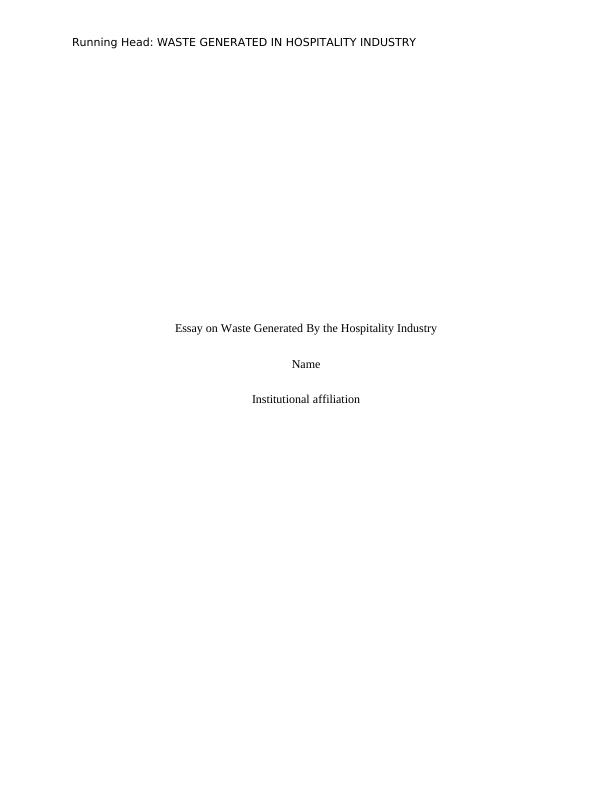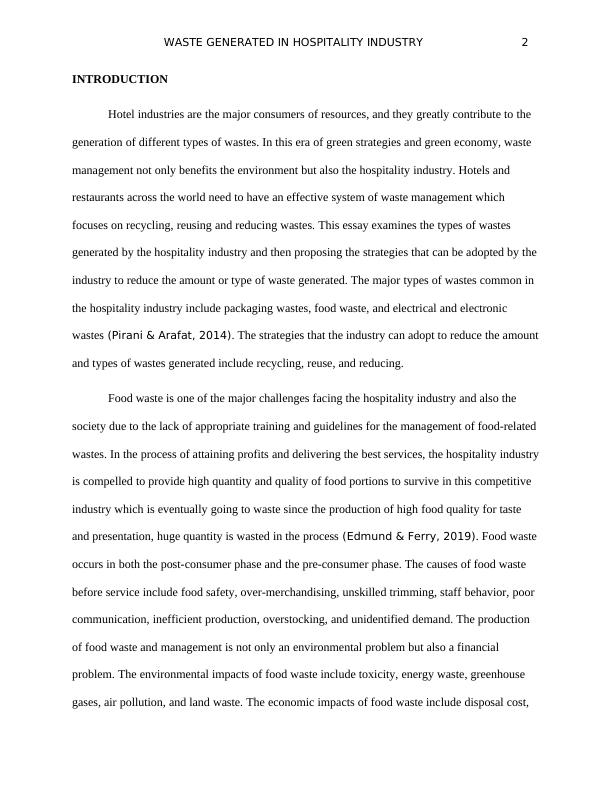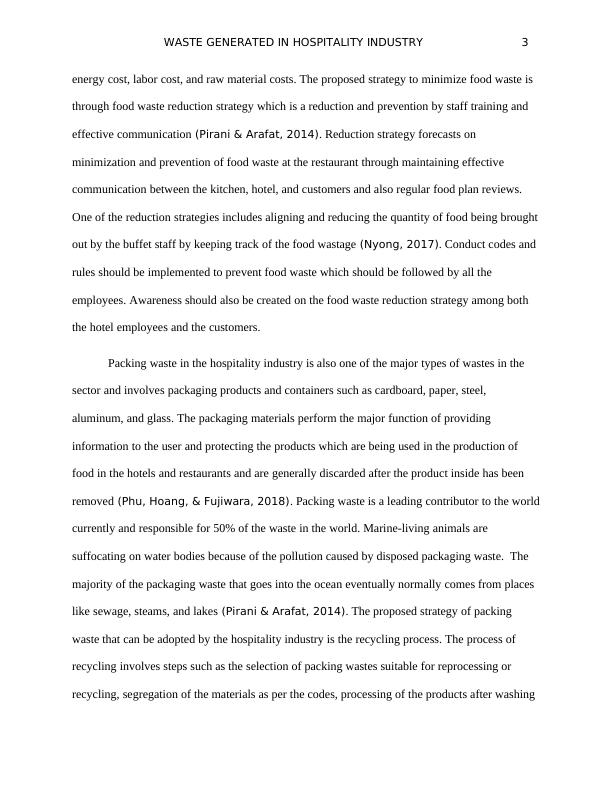Waste Generated in Hospitality Industry
Added on 2022-08-21
6 Pages1777 Words29 Views
Running Head: WASTE GENERATED IN HOSPITALITY INDUSTRY
Essay on Waste Generated By the Hospitality Industry
Name
Institutional affiliation
Essay on Waste Generated By the Hospitality Industry
Name
Institutional affiliation

WASTE GENERATED IN HOSPITALITY INDUSTRY 2
INTRODUCTION
Hotel industries are the major consumers of resources, and they greatly contribute to the
generation of different types of wastes. In this era of green strategies and green economy, waste
management not only benefits the environment but also the hospitality industry. Hotels and
restaurants across the world need to have an effective system of waste management which
focuses on recycling, reusing and reducing wastes. This essay examines the types of wastes
generated by the hospitality industry and then proposing the strategies that can be adopted by the
industry to reduce the amount or type of waste generated. The major types of wastes common in
the hospitality industry include packaging wastes, food waste, and electrical and electronic
wastes (Pirani & Arafat, 2014). The strategies that the industry can adopt to reduce the amount
and types of wastes generated include recycling, reuse, and reducing.
Food waste is one of the major challenges facing the hospitality industry and also the
society due to the lack of appropriate training and guidelines for the management of food-related
wastes. In the process of attaining profits and delivering the best services, the hospitality industry
is compelled to provide high quantity and quality of food portions to survive in this competitive
industry which is eventually going to waste since the production of high food quality for taste
and presentation, huge quantity is wasted in the process (Edmund & Ferry, 2019). Food waste
occurs in both the post-consumer phase and the pre-consumer phase. The causes of food waste
before service include food safety, over-merchandising, unskilled trimming, staff behavior, poor
communication, inefficient production, overstocking, and unidentified demand. The production
of food waste and management is not only an environmental problem but also a financial
problem. The environmental impacts of food waste include toxicity, energy waste, greenhouse
gases, air pollution, and land waste. The economic impacts of food waste include disposal cost,
INTRODUCTION
Hotel industries are the major consumers of resources, and they greatly contribute to the
generation of different types of wastes. In this era of green strategies and green economy, waste
management not only benefits the environment but also the hospitality industry. Hotels and
restaurants across the world need to have an effective system of waste management which
focuses on recycling, reusing and reducing wastes. This essay examines the types of wastes
generated by the hospitality industry and then proposing the strategies that can be adopted by the
industry to reduce the amount or type of waste generated. The major types of wastes common in
the hospitality industry include packaging wastes, food waste, and electrical and electronic
wastes (Pirani & Arafat, 2014). The strategies that the industry can adopt to reduce the amount
and types of wastes generated include recycling, reuse, and reducing.
Food waste is one of the major challenges facing the hospitality industry and also the
society due to the lack of appropriate training and guidelines for the management of food-related
wastes. In the process of attaining profits and delivering the best services, the hospitality industry
is compelled to provide high quantity and quality of food portions to survive in this competitive
industry which is eventually going to waste since the production of high food quality for taste
and presentation, huge quantity is wasted in the process (Edmund & Ferry, 2019). Food waste
occurs in both the post-consumer phase and the pre-consumer phase. The causes of food waste
before service include food safety, over-merchandising, unskilled trimming, staff behavior, poor
communication, inefficient production, overstocking, and unidentified demand. The production
of food waste and management is not only an environmental problem but also a financial
problem. The environmental impacts of food waste include toxicity, energy waste, greenhouse
gases, air pollution, and land waste. The economic impacts of food waste include disposal cost,

WASTE GENERATED IN HOSPITALITY INDUSTRY 3
energy cost, labor cost, and raw material costs. The proposed strategy to minimize food waste is
through food waste reduction strategy which is a reduction and prevention by staff training and
effective communication (Pirani & Arafat, 2014). Reduction strategy forecasts on
minimization and prevention of food waste at the restaurant through maintaining effective
communication between the kitchen, hotel, and customers and also regular food plan reviews.
One of the reduction strategies includes aligning and reducing the quantity of food being brought
out by the buffet staff by keeping track of the food wastage (Nyong, 2017). Conduct codes and
rules should be implemented to prevent food waste which should be followed by all the
employees. Awareness should also be created on the food waste reduction strategy among both
the hotel employees and the customers.
Packing waste in the hospitality industry is also one of the major types of wastes in the
sector and involves packaging products and containers such as cardboard, paper, steel,
aluminum, and glass. The packaging materials perform the major function of providing
information to the user and protecting the products which are being used in the production of
food in the hotels and restaurants and are generally discarded after the product inside has been
removed (Phu, Hoang, & Fujiwara, 2018). Packing waste is a leading contributor to the world
currently and responsible for 50% of the waste in the world. Marine-living animals are
suffocating on water bodies because of the pollution caused by disposed packaging waste. The
majority of the packaging waste that goes into the ocean eventually normally comes from places
like sewage, steams, and lakes (Pirani & Arafat, 2014). The proposed strategy of packing
waste that can be adopted by the hospitality industry is the recycling process. The process of
recycling involves steps such as the selection of packing wastes suitable for reprocessing or
recycling, segregation of the materials as per the codes, processing of the products after washing
energy cost, labor cost, and raw material costs. The proposed strategy to minimize food waste is
through food waste reduction strategy which is a reduction and prevention by staff training and
effective communication (Pirani & Arafat, 2014). Reduction strategy forecasts on
minimization and prevention of food waste at the restaurant through maintaining effective
communication between the kitchen, hotel, and customers and also regular food plan reviews.
One of the reduction strategies includes aligning and reducing the quantity of food being brought
out by the buffet staff by keeping track of the food wastage (Nyong, 2017). Conduct codes and
rules should be implemented to prevent food waste which should be followed by all the
employees. Awareness should also be created on the food waste reduction strategy among both
the hotel employees and the customers.
Packing waste in the hospitality industry is also one of the major types of wastes in the
sector and involves packaging products and containers such as cardboard, paper, steel,
aluminum, and glass. The packaging materials perform the major function of providing
information to the user and protecting the products which are being used in the production of
food in the hotels and restaurants and are generally discarded after the product inside has been
removed (Phu, Hoang, & Fujiwara, 2018). Packing waste is a leading contributor to the world
currently and responsible for 50% of the waste in the world. Marine-living animals are
suffocating on water bodies because of the pollution caused by disposed packaging waste. The
majority of the packaging waste that goes into the ocean eventually normally comes from places
like sewage, steams, and lakes (Pirani & Arafat, 2014). The proposed strategy of packing
waste that can be adopted by the hospitality industry is the recycling process. The process of
recycling involves steps such as the selection of packing wastes suitable for reprocessing or
recycling, segregation of the materials as per the codes, processing of the products after washing

End of preview
Want to access all the pages? Upload your documents or become a member.
Related Documents
Practices Related to the Reducing, Reusing and Recycling of Wasteslg...
|10
|2211
|64
Environmental audit for the hospitality industrylg...
|7
|1589
|33
(pdf) Recycling Construction Sitelg...
|6
|1497
|131
SWOT Analysis for Sustainable waste management in Construction.lg...
|1
|874
|4
Hospitality Industry Assignment | Emerging Trendslg...
|11
|3567
|254
The Role of Eco-Friendly Initiatives on Consumer Decision Making in Selecting a Holiday Destinationlg...
|8
|1911
|35
